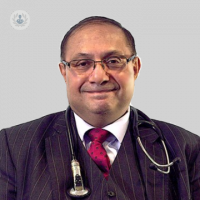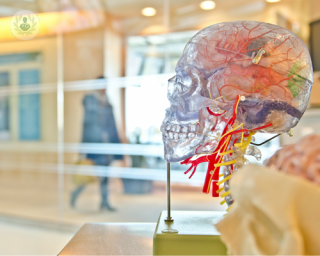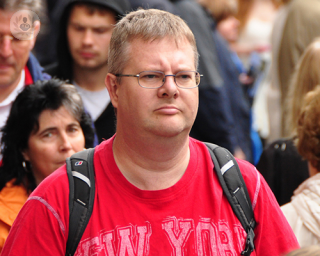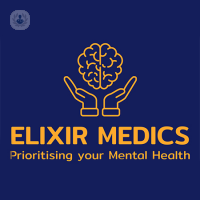Dementia
Dr Mashkur Khan - Internal medicine
Created on: 03-03-2014
Updated on: 10-11-2023
Edited by: Sophie Kennedy
What is dementia?
Dementia is the gradual loss of cognitive functions due to brain damage. This disease causes the inability to perform daily living activities due to it affecting several skills:
- Memory
- Language (aphasia)
- Attention
- Visual
- Praxis (performing intentional movements and gestures)
- Functions such as problem-solving or inhibition of responses
As the disease progresses, loss of orientation and identity can also be observed.

Prognosis
Dementia is a serious condition due to it affecting brain cells. Depending on the patient's condition, their symptoms and causes may be treated. However, once brain cells have been destroyed, it’s not possible to replace them.
If it’s suspected that you or a family member may have dementia, seek medical help as soon as possible.
Symptoms of dementia
The main symptom of dementia is memory loss, although it can lead to other symptoms that can appear over time, or all at once:
Recent memory loss
It is a recurring symptom that people with dementia forget things, although they never remember them again. It is possible that, for example, a person suffering from this pathology cooks and forgets to serve the dish, or even forgets that he or she has prepared it.
Difficulty doing previously simple tasks
Simple tasks such as dressing can be a problem for a patient with dementia and they may forget that they have already done a task. Tying shoes or putting certain foods in the fridge can also be easy habits to forget.
Language problems
Forgetting simple words or using them the wrong way is common in people with dementia. Communication can be complicated.
Confusion of time and place
People affected by dementia can forget how they got to a certain place, how to go home or they can get lost even in their own street or a place they have previously known very well.
Being distracted
It is true that everyone can be distracted, although people with dementia are often and repeatedly distracted.
Problems with abstract thinking
Forgetting what numbers are and how they are used can be a symptom of dementia.
Placing objects in the wrong places
Putting an iron in the fridge or bread in the washing machine, for example, are also habits that indicate that the affected person may be suffering from dementia.
Personality changes
People with dementia tend to be irritable, suspicious, fearful or depressed as a result of their condition.
Changes in mood
People affected by dementia can often have sudden mood swings, going from being calm to crying inconsolably in just a few minutes.
Loss of initiative
People suffering from dementia can often become passive. They may not want to go out to places or see other people.
Medical tests to diagnose dementia
For the diagnosis of dementia, the specialist will perform a physical examination of the patient and review their symptoms. They may also perform complementary tests to find out if the dementia is caused by another disease. If so, they will assess the condition and carry out the most appropriate treatment.
What are the causes of dementia?
Dementia is caused by damage to brain cells and other diseases:
- Alzheimer's
- Stroke
- Huntington's disease
- Multiple sclerosis
- Infections like HIV, syphilis and Lyme disease
- Parkinson's disease
- Pick's disease and progressive supranuclear palsy
Some of the causes that can be stopped or reversed are brain injuries and tumours, long-term alcohol abuse, change in blood sugar and sodium levels, low levels of vitamin B12, normal pressure hydrocephalus, use of certain medications and brain infections.
Can it be prevented?
There is no specific method of prevention to avoid suffering from dementia. However, if a patient has suffered a head injury or brain tumour, they’ll be advised to see a specialist in addition to taking precautions to avoid additional trauma.
Treatments for dementia
Some causes of dementia can be treated but once brain cells have been destroyed, they cannot be replaced. Treatment can delay or stop damage to brain cells, but it will always depend on the individual patient and their condition.
When the cause cannot be treated, treatment is based on helping the patient manage their daily activities and reducing the impact of symptoms. Some medications can help delay the progression of dementia - a specialist will determine the type of medication according to each particular case. There are several drugs that can help alleviate symptoms or slow the progression of dementia, although they will not fight it.















